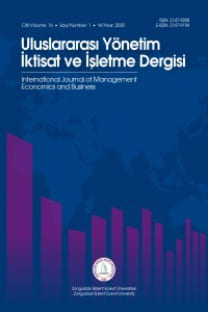YAŞAM TARZININ ALTERNATİF TURİZM TALEBİ ÜZERİNE ETKİSİ
Turizm talebi güçlü bir şekilde kültürel, sosyal, kişisel ve psikolojik özelliklerden etkilenmektedir. Bu araştırma kişisel ve psikolojik özelliklerden olan yaşam tarzının alternatif turizme olan talebi etkileyip etkilemediğini araştırmak üzere kurgulanmıştır. Anket formunun ve kolayda örneklemin kullanıldığı bu araştırma, 402 katılımcı ile Aksaray ili, Türkiye’de gerçekleştirilmiştir. Çoklu regresyon analizi sonuçları yaşam tarzının alternatif turizme olan talebi etkilediğini göstermektedir. Buradan hareketle, bu çalışma hedef pazarın yaşam tarzına göre alternatif turizmin bir turizm çeşitlendirme aracı olarak kullanılabilmesinin önemini ortaya koymaktadır.
Anahtar Kelimeler:
Yaşam Tarzı, Alternatif Turizm, Pazar Bölümlendirme, Turizm Çeşitlendirme
THE EFFECT OF LIFESTYLE ON THE DEMAND FOR ALTERNATIVE TOURISM
Tourism demand was strongly affected by cultural, social, personal, and psychological characteristics. Lifestyle is one of the personal and psychographic characteristics and this study was designed to investigate whether life style affects the demand for alternative tourism. This study was conducted in Aksaray, Turkey and study data were gathered from 402 participants, determined through convenience sampling method, via a questionnaire. Results of the multiple regression analyses demonstrated the effect of lifestyle on the demand for alternative tourism. Thus, this study revealed the importance of alternative tourism as a tourism product diversification tool according to target markets’ lifestyle
___
- Butler, R.W. (1990). Alternative tourism: Pious hope or trojan horse?. Journal of Travel Research, 28(3), 40-45.
- Dale, M. (2010). BTEC level 3 national travel and tourism student book 1, Pearson Education Limited, Harlow, United Kingdom.
- Deniz A., Godekmerdan, L., & Yuce, A. (2011). A Study on determining the lifestyles of consumers who buy global branded products, Cumhuriyet University Journal of Economics and Administrative Sciences, 12(2), 79-90.
- Gartner, W. C. (1996). Tourism development: Principles, processes, and policies. New York: Van Nostrand Reinhold.
- Hoyer, W. D., & Maclnnis, D.J. (2008), Consumer behavior, 5th edition, South-Western, USA. Jersey.
- Turkey in Statistics 2014 (2015). Turkish statistical institute, Ankara, Turkey.
- Kaya, H. (2013). The effects of personal values on consumer’s decision making styles: A study in Turkish Republic of Northern Cyprus, MBA Thesis, Cyprus International University.
- Khan, M. (2006). Consumer behaviour and advertising management. New Age International Limited, Publishers 4835/24, Ansari Road, Daryaganj, New Delhi – 110002.
- Kılıc, B., & Kurnaz, A. (2010). Alternative tourism and ecological farms on creating diversification of tourism product: Example of pastoral valley, Isletme Arastırmaları Dergisi, 2(4), 39-56.
- Kotler, P., & Keller, K. L. (2012). Marketing management, 14th Edition, Prentice Hall Inc., New
- Lertcharoenchoke, N. (1999). Alternative tourism, ABAC Journal, 19(2), 23-32.
- Lin, F.Y. (2003). An analysis of hospitality consumer lifestyles in the United States, Texas Tech University, PhD Dissertation, USA, UMI.
- Michman, R. D., Mazze, E. M., & Greco, A. J. (2003). Lifestyle marketing: Reaching the new American consumer, Praeger Publishers, Westport.
- Peter, J.P., & Olson, J.C. (2010). Consumer behavior & marketing strategy , 9th edition, New York: McGraw-Hill Irwin.
- Smith, V., & Eadington, W. (1992). Tourism alternatives: Potentials and problems in the development of tourism. University of Pennsylvania Press, Philadelphia.
- Solomon, M., Bamossy, G., Askegaard, S., & Hogg, M. K. (2006). Consumer behaviour: A European perspective, 3rd edition, Prentice Hall-Financial Times, Harlow.
- Strategic Business Insights, (2015). VALS, http://www.strategicbusinessinsights.com/ vals/ ustypes.shtml, Date Accessed:15.02.2015.
- Tezcan, B. (2004). Developing alternative modes of tourism in Turkey. Unpublished Dissertation, Middle East Technical University, Ankara.
- UNWTO Tourism Highligths 2015 Edition (2015). World Tourism Organization UNWTO.
- Wongsiriwat, K. (2006). A study of influences of values, attitudes and lifestyles (VALS II) on brand equity of luxury handbags in Bangkok, MBA Thesis, Shinawatra University.
- Yıldırım, F., & Cengel, O. (2013). A research over the relationship between fast food consumption and consumer’s values & lifestyles in Turkey, Online Academic Journal of Information Technology, Winter, 4(11).
- ISSN: 2147-9208
- Başlangıç: 2005
- Yayıncı: Zonguldak Bülent Ecevit Üniversitesi
Sayıdaki Diğer Makaleler
AZERBAYCAN İÇİN PARA TALEBİ İSTİKRARININ ARDL YAKLAŞIMI İLE ANALİZİ
YÖNETİCİLERDE NARSİSİZM ÜZERİNE BİR ARAŞTIRMA
SAHİPLİK YAPISI VE AR-GE HARCAMALARI: BORSA İSTANBUL ÖRNEĞİ
Mesut DOĞAN, Murad TİRKAKİOĞLU
AKILCI İLAÇ KULLANIMI İLE İLGİLİ HASTANE UYGULAMALARININ DEĞERLENDİRİLMESİ: ASİSTAN HEKİMLER ÖRNEĞİ
TÜRKİYE’DEKİ TOP 50 FORTUNE FİRMALARININ KURUMSAL WEBSİTELERİNDE ENGELLİ İÇERİĞİ
